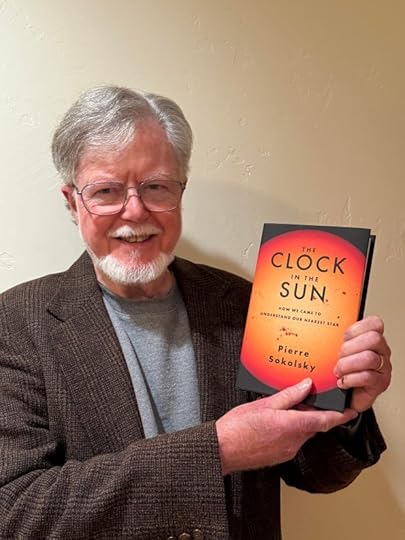Local books: A life in science, a legacy in storytelling
From his home in Pacific Grove, a former University of Utah dean emeritus is on a mission to make science simple and exciting for all. Retired particle physicist Pierre Vsevolod Sokolsky is now turning his focus to a new frontier — the sun.
Sokolsky says his journey from accelerator physics to solar science has been shaped by curiosity, a love of teaching and an openness to new intellectual pursuits. “I got really fascinated, particularly with the solar cycle, the appearance of sunspots on a regular basis,” Sokolsky said. That interest evolved into a popular course for the liberal arts students at the University of Utah and now his latest book, “The Clock in the Sun: How We Came to Understand Our Nearest Star.”
Post retirement, Sokolsky is sharing his knowledge of the Sun at the Osher Lifelong Learning Institute at Cal State Monterey Bay which offers adults over 50, a community to explore curated courses and engage in flexible learning formats. “After I signed up for some courses (at Lifelong Learning ), I gave several lectures on cosmic rays and next month I’m giving lectures on the subject of my book,” said Skolsky.
A career among the starsSokolsky’s scientific journey began with a Ph.D. from the University of Illinois, followed by research in accelerator-based physics at Columbia University. While there, he developed an interest in cosmic ray physics. Moving to the University of Utah, he spent 25 years leading research on ultra-high-energy cosmic rays. He also took on administrative roles, serving as chair of the Physics Department and later as dean of the College of Science, before returning to full-time research and teaching.
 Local author and scientist Pierre Vsevolod. (Courtesy photo)
Local author and scientist Pierre Vsevolod. (Courtesy photo)During a sabbatical at the University of Adelaide in Australia, Sokolsky encountered solar science in a way that would change his trajectory. “What were these spots, why were they there?” he recalled wondering. The questions led him to develop a course on solar science for non-science majors, blending history, physics and literature.
Sokolsky’s latest book, published by Columbia University Press, dives into the history and science of the sun, tracing humanity’s understanding of solar cycles from ancient civilizations to modern astrophysics.
“I’ve always been a reader of literature, and, you know, classic novels, and I have a Russian background. I learned and I spoke Russian and French when I was a child. I’ve always had an interest in art, literature, poetry and (the book) was an opportunity to see whether I had any talent in that direction.” His book explains how solar cycles affect weather patterns, climate change and even technology. “Solar storms can disrupt power grids and GPS systems,” he said.
Why go anywhere else?Retirement offered Sokolsky and his wife the opportunity to explore new places and they set out on a driving trip along the West Coast. “The plan was to go all the way up to Washington and look at all the little towns along the seashore,” he said.
But Pacific Grove had other plans. “We rented a little house downtown for a week, and on the second morning, we looked out and said, ‘We really like this. Why go further?’”
Since retiring, Sokolsky has embraced the artistic and natural beauty of Monterey. He has taken up landscape photography, capturing the region’s dramatic coastal scenery and its wildlife.
“Monterey coastline is so beautiful that it’s just, luckily I live three blocks from the bay, so I can go down every day and see the changing light and the waves and photograph. If you have a good zoom lens, you can get very nice pictures and birds.” He’s also an avid guitarist, growing his collection of instruments and enjoying music as a creative outlet.
Sokolsky’s book is available at local bookstores, libraries and online platforms, including Columbia University Press. For those interested in learning more, his upcoming lectures at the Osher Lifelong Learning Institute (https://olli.csumb.edu/) offer a chance to hear directly from a scientist who has spent a lifetime exploring the frontiers of knowledge.



